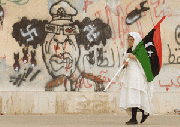ABU DHABI — Major powers met on Thursday to map out what the
United States calls an inevitable “post-Gaddafi Libya” as Italy
promised hundreds of millions of euros in aid to answer rebel pleas for funds.

|
| A Libyan woman holding a Kingdom of Libya flag walks past a caricature of Muammar Gaddafi near the court house in Benghazi June 8, 2011. REUTERS/Esam Al-Fetori |
U.S. Secretary of State Hillary Clinton and counterparts
from NATO and other countries participating in air strikes against Moamer
Gaddafi’s administration held their third round of Libya talks in the United
Arab Emirates capital Abu Dhabi.
“Gaddafi’s days are numbered. We are working with our
international partners through the UN to plan for the inevitable: a
post-Gaddafi Libya,” Clinton told participants, according to her prepared
remarks distributed by aides.
“Time is on our side,” the chief U.S. diplomat
said, adding the international military, economic and political pressure was
mounting on the Libyan colonel who has been in power for four decades.
“In the days ahead,” she said, “we have to
coordinate the many plans taking shape and work closely” with the rebel
National Transitional Council (NTC) and the Libyan people.
“Each of these efforts helps us to protect the Libyan
people and lay the groundwork for a unified, democratic, and peaceful
future,” she said.
But Clinton offered no direct U.S. financial contribution to
the rebels, pledging instead another “$26.5 million to help all the
victims of this conflict, including Libyan refugees.”
Such money will likely be distributed through relief
agencies.
U.S. officials said the United States would urge Arab
countries to offer more funds to the rebel administration based in Libya’s
second city of Benghazi.
Italy meanwhile will provide Libya’s rebel council with
loans and fuel products worth 300 to 400 million euros ($438 million to $584
million), an Italian foreign ministry spokesman Maurizio Massari said.
Foreign Minister Franco Frattini of Italy, the former
colonial power in Libya, is co-chairing the meeting which is aimed to establish
a financial mechanism to help the rebels’ NTC.
The minister of oil and finance in the Libyan rebel council,
Ali Tarhoni, warned that “if no financial concrete support comes out of
this conference, we will consider that a total failure.”
He said he hoped that at the very least Western governments
would extend loans to the opposition secured on the billions of dollars of
assets of the Gaddafi government frozen abroad.
Tarhoni said that the rebels will start producing 100,000
barrels of oil per day “soon”.
“We are hoping soon” he said, when asked when the
rebels would start producing oil from the eastern fields under their control.
“100,000 barrels per day, or so,” he added.
The opposition has complained that it has seen nothing
concrete since the contact group last met on May 5 in Rome when the powers
agreed to set up a fund to aid the rebels and promised to tap frozen Gaddafi
assets.
Two dozen countries, including key NATO allies Britain,
France and Italy, as well as delegates from the United Nations, the Arab
League, the African Union and the Organization of Islamic Conference are
attending the talks.
A U.S. official told reporters on condition of anonymity on
Wednesday that Washington cannot say whether the NTC “is ready to assume
complete control” even if Gaddafi’s fall is only a matter of time.
He also cautioned that there was no international consensus
over when Gaddafi should leave power, where he should go, or even whether he
should leave Libya.
The talks among the powers came amid continuing explosions
in the Libyan capital. Four blasts shook Tripoli on Thursday afternoon, an AFP
journalist said, although unable to pinpoint their location. During Wednesday
night into Thursday other explosions echoed through the city from near
Gaddafi’s compound, an AFP correspondent reported.
The Western alliance said it carried out 47 strike sorties
on Wednesday, hitting a vehicle storage facility in Tripoli and a missile
storage facility, a missile site, a command and control facility, a tank, and
four armored fighting vehicles just outside.
NATO said it also hit an electronic warfare vehicle and a
military training camp near Libya’s third-largest city Misrata.
The Mediterranean coastal city is the most significant
rebel-held enclave in western Libya and a rebel spokesman said up to 3,000
Gaddafi troops attacked it in a three-pronged movement from the south, west and
east on Wednesday.
Twelve people were killed and 33 wounded in the fighting in
which Gaddafi’s forces deployed gunships, tanks and Grad rocket launchers as
well as mortars, the spokesman, Hassan al-Galai, said.
Middle East Online






Leave a Reply